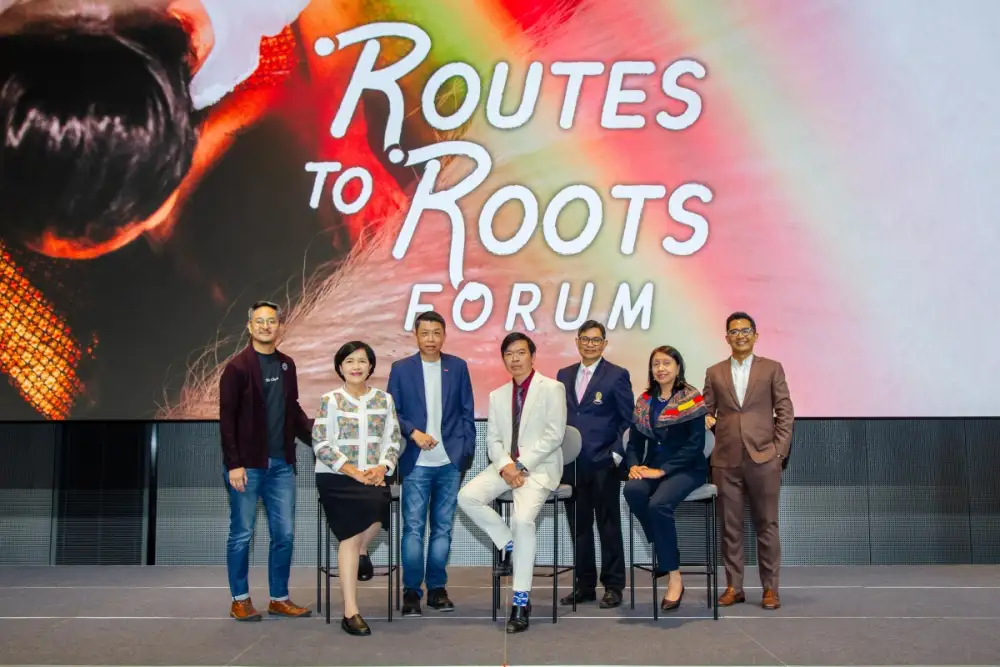
"Public, Academics and Private Sectors Brainstorm to Break Through Tourism Gridlock with Insights from Mobility Data"
The Ministry of Higher Education, Science, Research and Innovation (MHESI), through the Program Management Unit for Competitiveness (PMU-C) and the Office of National Higher Education Science Research and Innovation Policy Council (NXPO), in collaboration with the CU Social Design Lab at the Faculty of Architecture, Chulalongkorn University, True Corporation, and Cloud-and-Ground, have joined forces to break through the stagnation in Thailand's tourism industry amid shifting international travel trends, intensifying competition, and declining competitiveness. Together, they have launched a new initiative to stimulate the creative economy by promoting cluster tourism based on mobility data derived from mobile phone usage records. The project is supported by the National Science, Research and Innovation Fund (NSRF), and features the unveiling of six high-potential cultural routes under the theme "Routes to Roots", pioneering immersive travel experiences that reconnect with Thailand's cultural heritage.
Thai Tourism in a New Global Context
Tourism has long served as a major economic engine for Thailand. In 2019, the number of international tourist arrivals soared to nearly 40 million, contributing around 19% of the country's GDP and placing Thailand 4th in the world with tourism revenue of THB 60.5 billion. However, the COVID-19 pandemic marked a turning point. The global tourism landscape has since shifted, particularly in the Asia-Pacific region, where countries like Japan have seen a remarkable 112% growth, followed by Vietnam at 68%, and Thailand at 47%. Compared to the pre-COVID-19 period, Thailand's tourism recovery remains 12% below previous levels, reducing the sector's contribution to GDP to 14%. This is due to negative factors such as the global economic slowdown and ongoing geopolitical tensions. Meanwhile, key competitors like Vietnam, Indonesia, Singapore, and Japan are actively leveraging their unique strengths to attract tourists. Vietnam employs price competitiveness and promotes emerging destinations. Indonesia emphasizes its natural resources, offering luxury and comfort at accessible prices. Singapore continues to invest in man-made attractions that are luxurious, safe, and convenient, while Japan doubles down on its cultural identity and scenic cities, offering immersive experiences that are both appealing and affordable.
Enhancing Thailand's Tourism Potential through Cluster Tourism
Based on findings from True Corporation's Data Playground project, which analyzed mobility data from over 500 million travel trips between 2023 and 2024, distinct travel patterns were identified that can inform the development of emerging "must-visit" cities. These patterns offer valuable insights for infrastructure investment and destination planning, leveraging the unique identities of each locality to form new travel routes under the Cluster Tourism Strategy.
The mobility data analysis revealed 21 high-potential travel routes across Thailand that can be developed into cluster-based tourism experiences. Examples include Chiang Mai-Lampang-Lamphun, Nakhon Pathom-Ratchaburi-Kanchanaburi, Phetchaburi-Prachuap Khiri Khan-Samut Sakhon-Samut Songkhram and Khon Kaen-Chaiyaphum. To be viable as a tourism cluster, each group of destinations must meet five key criteria:
Professor Dr. Komgrit Leksakul, Deputy Executive Director of the Office of the National Science, Research and Innovation Policy Council (NXPO), outlined Thailand's research and development strategy, stating that "NXPO firmly believes that research and innovation are at the heart of driving the nation forward. They not only generate new knowledge but also serve as critical tools for addressing systemic challenges, enhancing national competitiveness, and supporting grassroots economic development. Insights from the Routes to Roots initiative demonstrate how structured analysis of big data can offer new perspectives for policymaking, tailored to a modern economy that values sustainability, inclusivity, and social equity. Guided by the vision 'SRI for All', NXPO is shaping a new future-oriented policy landscape. We are committed to advancing place-based research that delivers tangible impact at both community and national levels, fostering inclusive policy development, and ensuring that science, research, and innovation are accessible to everyone."
Mr. Ekaraj Panjavinin, Chief Digital Officer and (Acting) Chief Business Officer, True Corporation Plc., said that "Mobility data is a key enabler in shaping strategic direction for Thailand's tourism industry, helping it overcome current challenges while fostering long-term sustainability for both the sector and local communities nationwide. This data opens up opportunities to enhance the travel experience in multiple dimensions from improving mobility and managing crowd density at tourist sites to supporting emergency preparedness. It also empowers the creation of new tourism experiences, routes, and campaigns that reflect the authentic ways of life in each locality. Ultimately, it enables broader opportunity creation, more equitable income distribution to local businesses and communities, and positions Thailand with new competitive advantages on the global stage."
Asst. Prof. Dr. Nattapong Punnoi, Deputy Director of the CU Social Design Lab and Assistant Dean of the Faculty of Architecture, Chulalongkorn University, said that "In today's evolving competitive landscape, reshaping the tourism 'supply' can elevate Thailand's tourism industry, enhance its competitiveness, and unlock economic opportunities in emerging high-potential areas, referred to as 'destination-worthy cities.'
This cluster-based tourism strategy enables all stakeholders including policymakers, marketers, business leaders, investors, and local entrepreneurs to see the industry through a new lens. It uncovers fresh opportunities, new target groups, and innovative travel formats that can foster sustainable growth. This approach is especially relevant in an era where tourists increasingly seek authenticity, meaningful experiences, and deeper value.", said Asst. Prof. Dr. Nattapong. Further details on the clusters are available at: https://true.th/blog/routes-to-roots-cluster/
Routes to Roots: Exploring the Cultural Heritage of Thailand
From a national study that identified 21 potential tourism clusters, The Cloud applied cross-disciplinary expertise and creativity to bring new life to the data. The result is Routes to Roots, six curated trips through six regional clusters that reflect interconnected patterns of travel behavior, geography, and culture. These journeys aim to showcase shared cultural identities across provinces and regions of Thailand. Each route offers a unique, immersive exploration into the roots of Thai heritage:
Two more routes are set to launch soon as part of The Cloud Journey: Routes to Roots. For more details and upcoming trip registrations, visit readthecloud.co or follow The Cloud on Facebook.
Group Photo (From Left to Right)